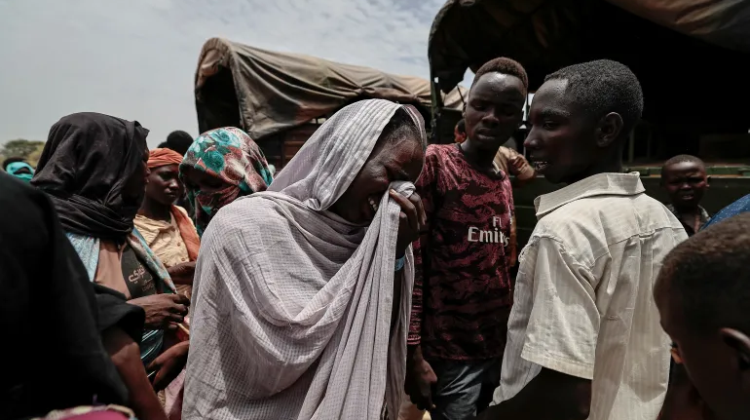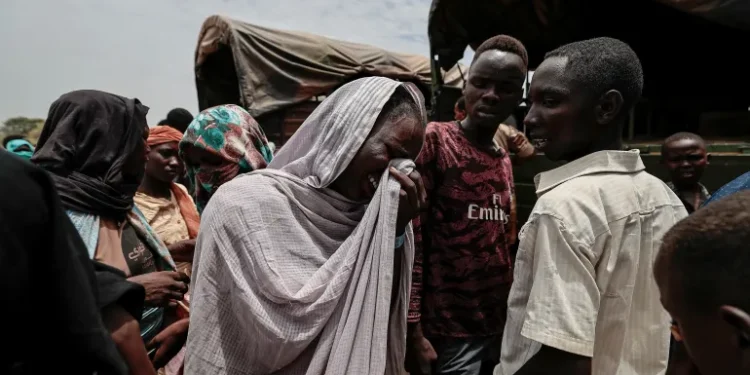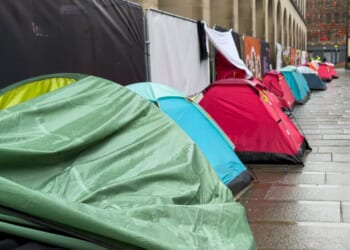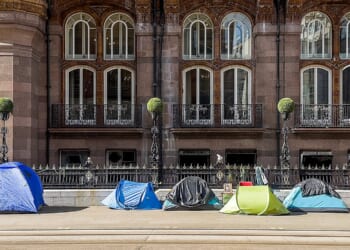
[Order Michael Finch’s new book, A Time to Stand: HERE. Prof. Jason Hill calls it “an aesthetic and political tour de force.”]
At a press conference held in Brussels this week, organized by the European Parliament’s Subcommittee on Human Rights and attended by representatives from Amnesty International, the UN Office for Humanitarian Affairs, and several European NGOs, alarming new evidence was presented about the use of chemical weapons in Sudan. Speaking before journalists and diplomats, panelists described the atrocities as “a silent genocide against women and children,” urging the EU and UN to take urgent action. From Brussels, the call for justice echoed through the chamber — a demand not only for accountability, but for the world to finally see the women suffering beneath Sudan’s toxic sky.
The conflict in Sudan, now entering its third year, has evolved into one of the world’s most devastating humanitarian crises. What began as a struggle for power between two military factions has turned into a campaign of destruction that spares no one — not the elderly, not the children, and least of all the women. Entire towns have vanished, and millions have been forced to flee. Amid the chaos and smoke of bombed-out cities, survivors describe something even more horrifying than the bullets: the slow suffocation under clouds of chemical gas.
Independent investigations by Amnesty International and Human Rights Watch have gathered credible evidence of chemical agents being used against civilians, particularly in Darfur. Witness accounts speak of burning eyes, blistered skin, difficulty breathing, and the unbearable stench of chlorine. In May 2025, the United States Department of State officially confirmed that Sudan’s military forces had used chemical weapons and imposed sanctions on key figures involved. This followed earlier reports from 2016, when similar attacks in Jebel Marra killed and injured hundreds of civilians, many of them women and children. Despite these findings, the world’s response has been largely symbolic — statements of concern without action, sympathy without accountability.
In every war, it is women who bear the hidden wounds. In Sudan, they are not only victims of displacement, hunger, and violence; they are also the unseen casualties of chemical warfare. When the bombs fall, it is women who rush to shield their children. When the gas spreads, it is women who inhale it first while closing the doors and covering the faces of their families. Pregnant women are at particular risk, suffering miscarriages and lifelong complications after exposure to toxic substances. Mothers care for their wounded loved ones without medicine or food, and when night comes, they try to sleep beneath a sky that has turned poisonous. These women are the backbone of communities collapsing under war, yet their suffering rarely reaches the headlines.
The use of chemical weapons is not only a tragedy; it is a crime under international law. The Chemical Weapons Convention, to which Sudan is a signatory, explicitly prohibits the use of such agents under any circumstances. Violations of this treaty amount to war crimes and, in many cases, crimes against humanity. And yet, the enforcement of these norms remains inconsistent. When such weapons are used in Europe or the Middle East, global outrage is immediate. But when they are used in Africa, the reaction is slow, muted, or absent. This double standard weakens international law and erodes faith in justice itself. It sends a dangerous message to perpetrators everywhere: that some crimes will be tolerated if they occur far enough from the spotlight.
Accountability must therefore be more than a word in press statements. The United Nations and the Organization for the Prohibition of Chemical Weapons (OPCW) have both the authority and the moral duty to act. Independent investigations should be launched immediately to verify reports, collect evidence, and identify those responsible. Governments and regional blocs must go beyond rhetoric, applying coordinated sanctions and travel bans to ensure that no leader or commander can escape justice. At the same time, humanitarian access must be guaranteed. Medical teams cannot save lives if they cannot reach the victims. Clinics in Sudan’s conflict zones operate without anesthesia, without clean water, and often under the threat of airstrikes. In these conditions, women give birth on the floor of bomb shelters, gasping for air through makeshift cloth masks.
Beyond the physical injuries lies a deeper wound — one of abandonment. The women of Sudan have been left to face the toxic sky alone. They are trapped in camps with little food, no medicine, and no hope for justice. The international aid system has failed them, crippled by bureaucracy and fatigue. Donor fatigue has turned compassion into statistics, and statistics into silence. Every day that the world delays action, another child breathes poison, another mother buries her family.
There are steps that can still be taken, and they must begin now. The OPCW should deploy technical experts to investigate and document chemical attacks. The United Nations Security Council must hold an emergency session focused on accountability, not politics. Humanitarian corridors must be established to ensure that aid reaches women and children in affected regions. Governments, NGOs, and media outlets should collaborate to give voice to the survivors — to tell their stories, not as numbers, but as names, faces, and memories. The goal is not just to expose suffering, but to compel change.
What is happening in Sudan is not a distant tragedy; it is a moral test for our time. Every unpunished chemical attack weakens the foundation of international law and normalizes the unspeakable. Every day of inaction devalues human life. The women of Sudan are not statistics in a report; they are survivors, mothers, and witnesses to crimes that the world refuses to name aloud. Their plea is simple — to breathe clean air, to live without fear, and to be seen.
History will not judge the world by its statements, but by its silence. Neutrality in the face of chemical warfare is complicity. The world cannot claim ignorance, only indifference. If humanity still has meaning, it must be proven now — not in words, but in deeds. The women of Sudan are waiting beneath a toxic sky, and every moment of silence is another breath stolen from them.
Rachel Avraham is the CEO of the Dona Gracia Center for Diplomacy and an Israel-based journalist. She is the author of “Women and Jihad: Debating Palestinian Female Suicide Bombings in the American, Israeli and Arab Media.”

















